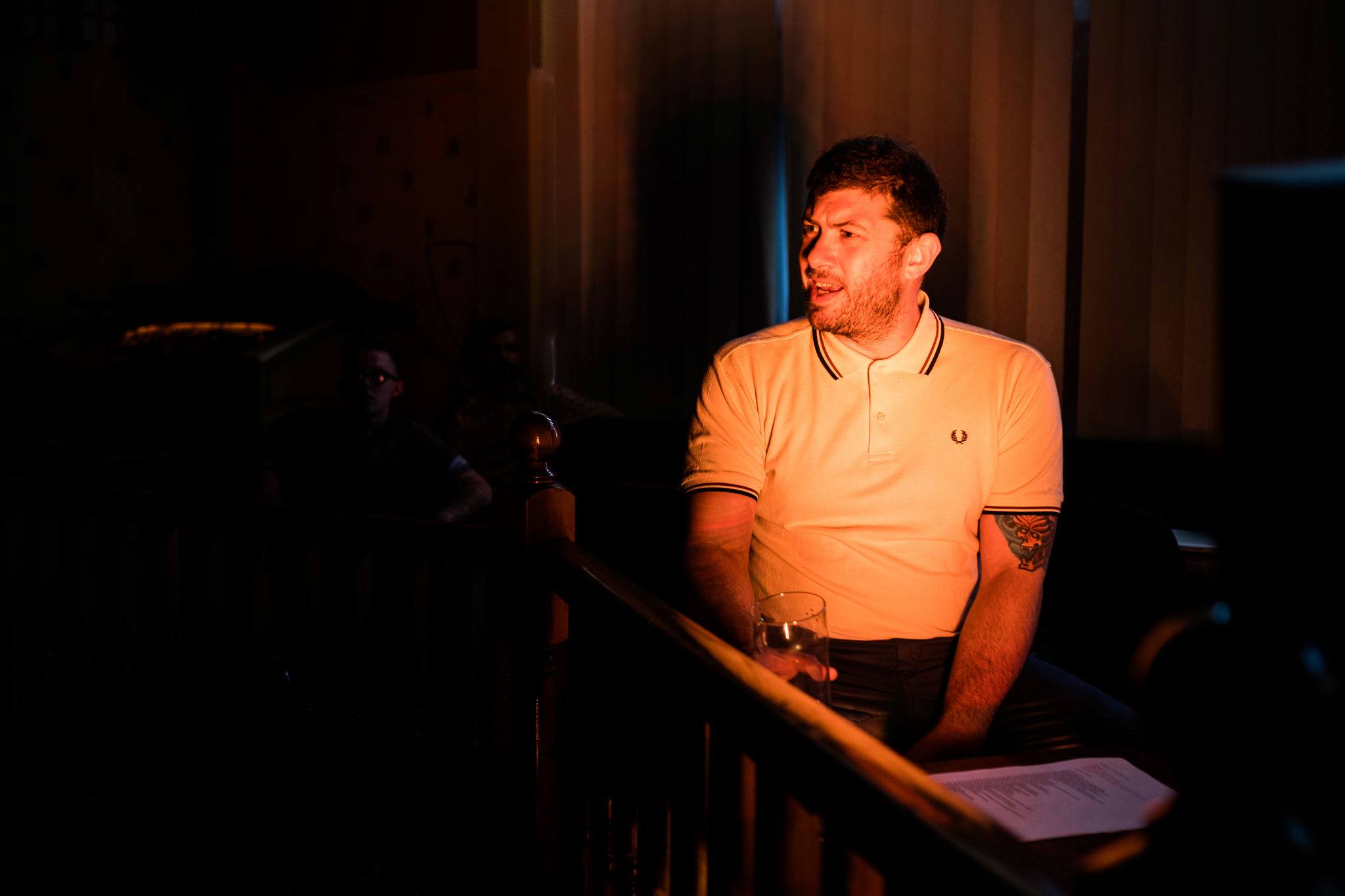Building back masculinity in Stoke-on-Trent's post-industrial landscape
Stoke’s factories and collieries are a reminder of the redundancy that many men have experienced and still feel.
On Thursday evenings in Cheadle, a small market town in Staffordshire, a group of men come together to talk about their problems. They meet anywhere they can find the space – taking walks, sitting outside the gym, or having a drink in a beer garden. The group is called Lad’s Army and was set up by Charlie Babington in February 2022.
Babington is a passionate Watford FC fan and is now also a dedicated mental health advocate. He suffered his own mental health problems after the breakdown of his marriage. Experiencing a lack of services in the area to assist men like himself, he founded Lad’s Army to actively work against the stereotype of the strong, silent man, and help those struggling like he had.
“There’s nothing more powerful for a man than when he hears another man has been through the same thing,” Babington tells The Stoke-on-Trent Lead. “The aim of Lad’s Army is to build a community of men who support each other through good and bad times – a community that is always there for you.”
Across the country groups like Lad’s Army are cropping up for men to come together and experience the benefits of spending time with other men and talking through their problems outside of the traditional arenas of work, the pub or sports fields.
Organisations like Andy’s Man Club and Men’s Sheds are increasingly being utilised to tackle male loneliness and isolation. Both organisations are represented in Stoke-on-Trent, where male suicide is well above the national average of at 15.9 per 100,000 at 23.1 and men account for four out of five suicides.
Babington meets men from all walks of life at his Lad’s Army sessions, all with unique stories and challenges, but which play out against a similar political background. In the shifting landscape of post-industrial Britain, the decline of traditional heavy industry has ruptured the foundation of working class masculine identities. The dissolution of once stable employment has severed the collective ties that long defined the lives of working class men, creating a void in both individual and shared identity.
“Living within working class areas comes with its own unique challenges and stresses,” says Babington. “If we look at the last couple of years in particular, with the cost of living crisis and the cost of almost everything rising, it’s no surprise to find that men are struggling, particularly if we look at gender roles where men are seen as the providers.”
In Stoke, as in many post-industrial heartlands, rapid deindustrialisation has inflicted lasting wounds on workers, families and communities. With the ceramics that once drove the city’s economy having been outsourced predominantly to Malaysia, Stoke’s derelict factories and disused collieries are a physical reminder of the redundancy that many men have experienced and still feel.
Deindustrialisation is central to the lived experiences of many Stokies, particularly as the labour market has shifted to provide increasingly precarious and isolating service sector jobs.
As Professor Anoop Nayak from the University of Newcastle observes, while industrial modernity offered physically demanding jobs, the late capitalist service-based economy hasn’t been able to replace the sense of stability, masculine camaraderie or pride in either ‘craft’ or ‘graft’ for many working class men.
Nayak is keen to point out that industrial pasts shouldn’t be romanticised and that a clear line can’t be drawn from post-industrial transformations directly to male depression of suicide.
“What I would argue though is that deindustrialisation can continue to leave its mark upon a community long after the shuttering of core industries,” he says. “The striking loss of industry can be experienced as a form of trauma, a wounding that does not heal overnight.”
Award-winning East Midlands poet, activist and lecturer Jamie Thrasivoulou has been writing about the problems facing men in the Midlands for years. His performance of the poem We Are Derby at the packed Derby County Stadium was later played at Wembley Stadium, fulfilling Thrasivoulou’s ambition to bring poetry to people it doesn’t usually reach.
His work addresses masculinity, mental health, criminality and class, and Thrasivoulou runs writing workshops for men in collaboration with the organisation ReStoke to address these issues directly.
“There certainly appears to be a societal problem in terms of depression and loneliness within men,” he says. “The writing sessions have definitely provided a space to help to combat this at a grassroots level. However more needs to be done at a higher level. The government needs to fund and support the issue.
“The catastrophic suicide levels amongst men below the age of 50 is surely enough evidence that more support and funding is required to combat the problem.”
After 14 years of Conservative rule and austerity, the social, economic, and health situation in many post-industrial towns is dire.
“The neoliberal climate affects masculinity on many levels,” says Thrasivoulou. “I’d say the most pervasive aspect of this is in terms of how the model allows for the shutting down of industries, without question. For many men I’ve worked with, I’ve always got a sense that there’s nothing more damaging to their identity as losing their industry.”
Where men in communities like Thrasivoulou used to work side-by-side in the potteries or down the mines, the expansion of the service sector in many old industrial areas has led to a gig economy, characterised by ‘flexible’ patterns of employment, part-time work and zero-hour contracts, with salaries that often slip below the minimum wage. These jobs are rarely unionised and the lack of regularity or stable income has decreased the strength of community ties.
“Class is the overriding issue not just in Britain, but the world over,” says Thrasivoulou. “It permeates every aspect of my work… Financial issues and barriers can often be the initial trigger in a person’s battle with their mental and emotional well-being.”

The Up Men choir project, run by ReStoke
This broader economic and political context is vital to understanding the issues that many men face. A 2019 report by the UN showed that austerity, job insecurity and inequality are fuelling mental illness, and a report by Public First in the same year revealed that working class men are less likely to be aware of or seek support for mental health problems.
The subject of mental health is, as Thrasivoulou states, undeniably political. And for many men affected by issues of loneliness, depression or anxiety, breaking out of traditional gender roles to talk about their problems can be a huge barrier.
Jamie Wells, locality officer for Support Staffordshire, faced this problem head-on when experiencing a relationship breakdown. Whilst struggling to understand his role as an individual and as a single parent, he bumped into an old friend who recommended attending the Up Men choir project, run by ReStoke.
“Being involved in Up Men gave me a chance to meet new people and regain social confidence,” he says. “It’s usually only at sports clubs where men are given a chance to be themselves and talk openly about experiences and feelings.”
But while the health and social benefits of creative activities are being more broadly accepted, the perception of arts as ‘feminine’ means men are less likely to engage with them.
“Sometimes men see themselves as family protectors and suppress any creative urge – except DIY – in favour of being a more strong and silent role model,” says Wells.
They are familiar feelings within the Up Men choir. Coordinator Adrian Ball says they have struggled with traditional perceptions of masculinity. As a non-binary person who was bullied as a result of their perceived femininity while growing up in Stoke in the ‘70s and ‘80s, Adrian was initially apprehensive about joining a male-only environment. But after performing in Man Up, a show at the Goldenhill Working Men’s Club to an audience of over 600 people, Adrian’s perspective completely shifted.
“I had been fully welcomed by the other men involved in the show,” Adrian says. “I had come to understand the value of male-only creative spaces and saw how men allowed themselves to be more vulnerable and open to new creative experiences.
“It totally changed my perspective on cis men and what it was to be masculine. Some of the other men had told me that they almost felt jealous of the freedom I had by being gender non-conforming and that they felt immense pressure to speak and act like a man.”
Babington points out that communities are stepping up to fill in the gaps in provision for men battling with their mental health and identity.
“In Stoke in particular, from speaking to members of ours, it’s clear that certain provisions and services have been cut due to lack of funding. That has led to men struggling on their own until they find us or other groups like us.”
If you need someone to talk to contact Samaritans on 116 123 or visit samaritans.org. Find out more about Lad’s Army, the Up Men choir, Andy’s Man Club and Men’s Sheds.
You can see the previous newsletter we sent to our subscribers here
The Lead is now on Substack.
Become a Member, and get our most groundbreaking content first. Become a Founder, and join the newsroom’s internal conversation - meet the writers, the editors and more.





